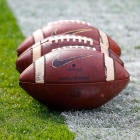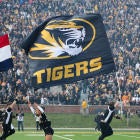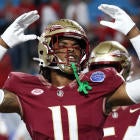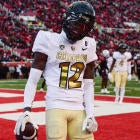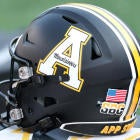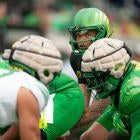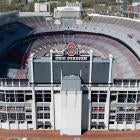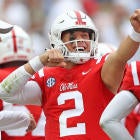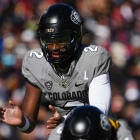The combination of bloated television contracts, increased exposure and injection of money from apparel deals into the fabric of college athletics has left one group out in the cold -- the athletes themselves.
Sure, college athletes get a full ride (including a scholarship) that allows them to work towards a prestigious degree with little-to-no debt while making lifetime connections that can be useful when their playing careers are over. They also receive professional training and other legal benefits that, from a monetary standpoint, are valued min the mid-six figure range.
But all of that is not enough any longer. Not when conferences are signing multi-billion dollar deals for broadcast rights, schools (and sometimes coaches) are making millions off apparel agreements and the life of a fired coach collecting his contractual buyout is the best life.
Amateurism has always been ingrained into the college athletics landscape, but based on a recent conversation the Associated Press had with NCAA president Mark Emmert, it appears that there's at least a little wiggle room in defining the term.
"There's a lot of discussion about the Olympic model, and [I] think it's well deserving of serious consideration inside the context of college sports," Emmert said.
So let's create that model within the context of college sports using three criteria:
- Players should be allowed to earn money off their names and athletic ability
- The integrity of the "student" aspect of "student-athlete" should be maintained
- The ability for teams to use their visibility (earning power) as a recruiting tool should be limited
All of this is attainable with relative ease. Let players earn money throughout their careers through endorsement deals that are part of the existing apparel contract structure with a set limit and add in room for legitimate endorsement deals from local and regional businesses.
Of course, the risk of local businesses exploiting the system and paying the star quarterback, the backup long snapper and everybody in between the maximum allowed exists. But if the NCAA is allowing a somewhat-modified version of the Olympic model anyway, the legal endorsement transactions will be recorded and declared. If it's necessary to classify players by tier in terms of what they bring to the table based on performance or even GPA, do so. Those are all relatively simple solutions.
Use the current enforcement structure to make sure -- to the best of the NCAA's ability -- that schools, coaches and players are prevented from exploiting the system.
Will transgressions still happen? Of course. They happen now and would occur under this hypothetical system across all sports. Let's not act like MLB and the NFL have been without their fair share of both on- and off-field problems. Players, coaches and teams always look for an edge. That won't go away no matter what rule changes are made or what proposals are ignored.
Put the money earned by these players into a trust similar to a 401K if you must and make it accessible tax-free upon graduation. At that point, the player can convert it into an actual 401K, withdraw all of it without penalty or do anything else he or she wants. It's their money. Incentivizing academics -- specifically, earning a degree -- will keep the "student" part of the "student-athlete" intact and perhaps even enhance it in the age of one-and-done basketball players and football players who plan for three-and-out before even signing a National Letter of Intent.
If a player wants or needs to access the money before graduation, tax it just like the federal penalty that currently exists on 401K early withdrawals.
These trusts can be managed by any of the many financial partners with whom the NCAA currently has relationships, and it can be adjusted by the player based on their specific desires. If they want to go ultra-conservative and make it a retirement plan, they can. If they want to be more risky and try to take advantage of a strong economy, that's fine, too. Not only are those personal decisions, they're great personal finance lessons that can be used later in life regardless of the specific industry in which the student-athlete winds up working .
Solving this issue doesn't need to be difficult, and it really shouldn't be as divisive as it seems to be. Scholarships, training, connections and everything that goes along with being a student-athlete today are massive benefits that normal students don't receive. But that doesn't mean it's enough compensation considering what universities, athletic departments and coaches are raking in off their labor.
Letting the players earn money based on their value, regulating those funds, incentivizing education and teaching real-world lessons by blending the Olympic model within the NCAA's current definition of amateurism would be a great way to do it.
It's at least a start.












